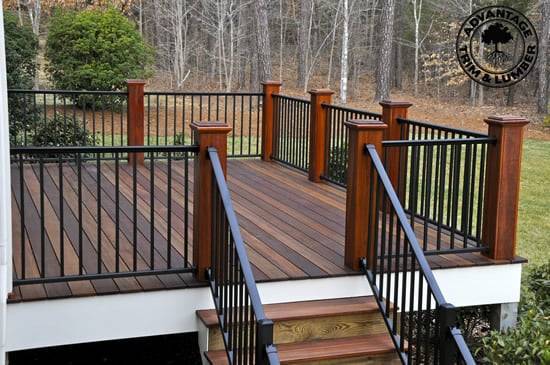
These days, being green and using eco-friendly products is more than a trend. Our whole economy is starting to recognize and value materials and items that have been manufactured and/or promote a healthy, green, and eco-savvy lifestyle. Even the recent oil spill in the Gulf of Mexico has shown us that there can be a heavy price to pay when we rely too much on environmentally problematic and damaging resources and materials.
What does this have to do with wood decking?
Well, there is a huge marketing push led by composite decking companies to cast all wood decking as non-eco-friendly. These companies want you to believe that all wood decking comes from illegal logging and that it decimates the world’s forests. Here’s the truth, as an FSC certified lumber supplier, the wood decking that we sell here at Advantage comes from eco-friendly forestry practices.
Here are 5 things you need to know about Green Decking:
- Species like Tigerwood, Garapa, Cumaru, and Ipe are renewable resources. With the growing number of managed forests and with the LACEY Act in place, you can find many green decking options that come from sustainable forestry methods.
- Composite decking is not as eco-friendly, or as dependable as advertised. In fact, because it originates from oil-based plastics and can’t be recycled, you can disqualify plastic decking from the list of eco-friendly products.
- FSC wood decking is available and can help you gain LEED certification credits. However, FSC certified decking shouldn’t be the be-all-end-all of green decking options. Just because FSC decking is more expensive, doesn’t mean that you’ll get superior boards. So, be careful about buying certified FSC wood just based on the label. Make sure you get Premium/Clear grade material. When you buy decking from Advantage, you will be purchasing decking material that comes from the same areas and are harvested using the exact same FSC standards.
- Not all green decking is expensive. Unfortunately, many eco-friendly wood products jack up their prices just because they put the green label on their products. Let’s be clear, Tigerwood decking and other hardwood species were just as green and 100% free of chemical additives years ago. These days, we’re just paying attention and valuing the inherent qualities that make these wood decking products “green.”
- When you strip away all the hype you’ll find that wood decking, especially the exotic hardwoods, are eco-friendly from a purely practical perspective. They last for decades, don’t require chemicals to resist decay and insects, are a renewable resource, don’t emit gasses or contain toxins (like formaldehyde or dioxin), were harvested using sustainable forestry methods, and will not have to be replaced. When you’re long gone from your home, you can also rest assured that the decking is 100% biodegradable.
These benefits mean that you can buy and build a green deck with confidence knowing that your purchase is an environmentally sound one that won’t negatively impact the environment.
If you have questions, or find this information of interest, share it with your network, and leave us a comment below. We’d love to hear from you.
Can this kind of decking be used in Mid-Michigan?
Yes it can!
Where is the fencing and wood posts from?
We supplied the posts themselves, but I don’t know where the homeowner purchased the post caps or railing.
Tigerwood Slip Posts: https://buyhardwood.advantagelumber.com/p-2068-tigerwood-slip-post.aspx
Railing looks like fortress railing